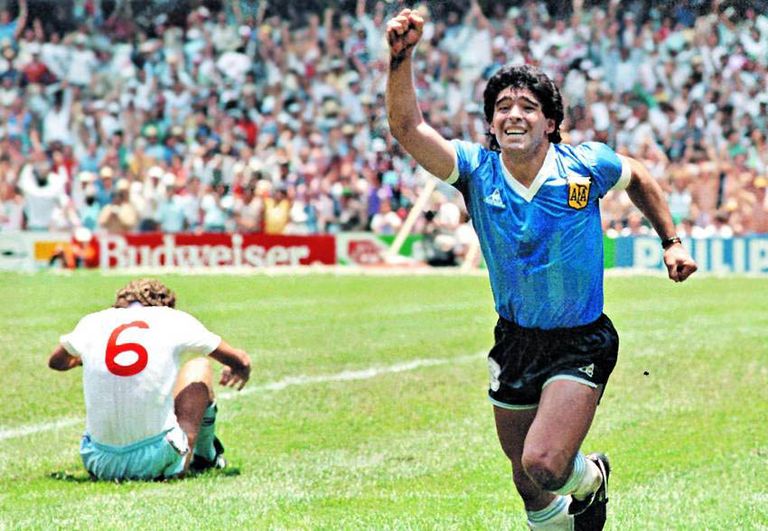
In the 1986 World Cup quarterfinal match between Argentina and England, Argentine footballer Diego Maradona scored two goals to lift Argentina to a 2-1 win over England. The first goal he scored, known as the Hand of God goal, was dubbed by the German press agency DPA as “the scandal of the century”.[1]
Six minutes into the second half of the game, Maradona passed the ball to Jorge Valdano and continued his run from the left hand side of the field. Steve Hodge intercepted the pass, and in an attempt to clear the ball, he accidentally moved it in Maradona’s direction. Maradona hit the ball with his left fist, volleying it into the net past goalkeeper Peter Shilton. At the post-game press conference, Maradona remarked that he scored his first goal “un poco con la cabeza de Maradona y otro poco con la mano de Dios” (“a little with the head of Maradona and a little with the hand of God”).[2] Soon after the game in Mexico City, Tunisian referee Ali Bin Nasser claimed that he had a hemorrhoid treatment that affected his eyesight and consequently, caused him to overlook Maradona’s misstep and allow the Argentine’s infamous goal to count.[3]
The “Hand of God” goal is memorable not only because it ignited a longstanding controversy and crushed England’s World Cup dreams, but also because it signifies the entanglement of football and politics in the 1986 quarterfinal matchup between Argentina and England. On game day, England’s victory over Argentina in the Falklands War in 1982 was far from a distant memory—it was an opportunity for Argentina to exact revenge on England for winning the conflict, which cost Argentina control of two overseas territories in the South Atlantic that it invaded, occupied, and laid claim to.[4] The following quote from Maradona captures the idea that Argentina’s win was revenge for its defeat in the Falklands War. He said, “It was as if we had beaten a country, not just a football team… Although we had said before the game that football had nothing to do with the Malvinas war, we knew they had killed a lot of Argentine boys there, killed them like little birds. And this was revenge.”[5]
To Roberto Perfumo, a former Argentine footballer, the 1986 World Cup quarterfinals was a political contest in which soccer took a backseat. He remarked, “In 1986, winning that game against England was enough. Winning the World Cup was secondary for us. Beating England was our real aim.”[6] Maradona’s Hand of God goal will likely always be marred by controversy, but the entwinement of football and politics on soccer’s biggest stage is harder to call into question.
Referees are a team, for that goal I actually blame the lineman he was the one who had the best, unobstructed view.